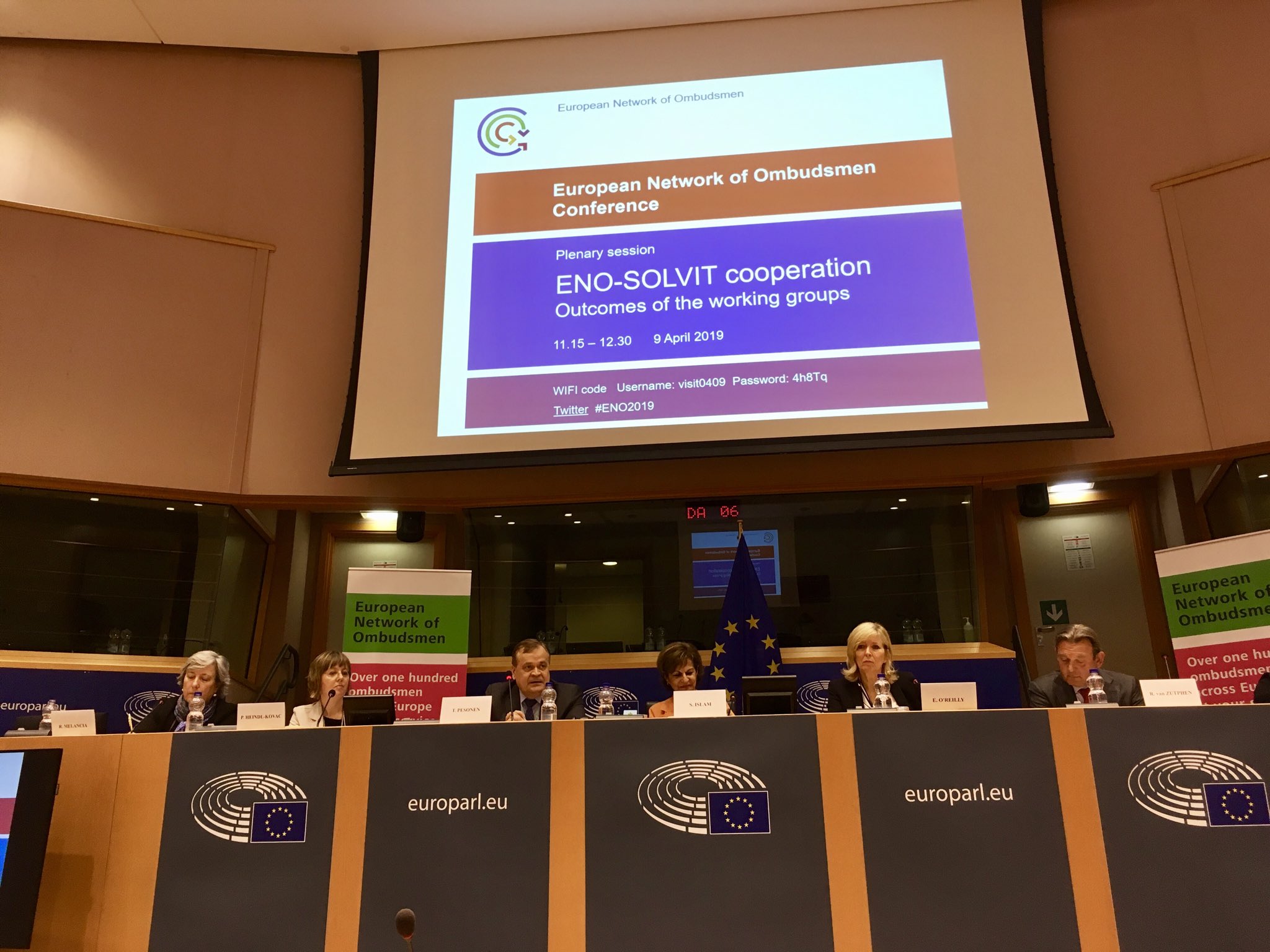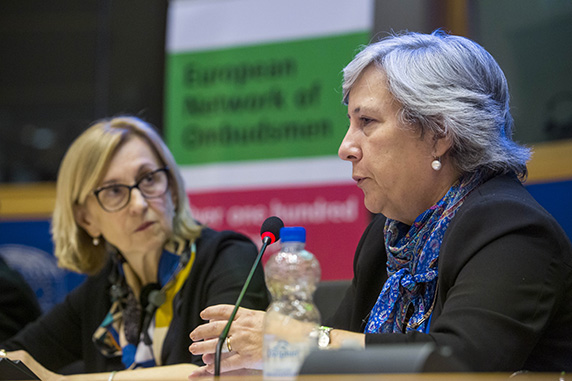
European Network of Ombudsmen
SOLVIT and cross-border problem solving in the EU

Since its creation in 1993, the EU’s Single Market has offered new opportunities to citizens to move throughout Europe, whilst protecting their rights. It has also helped to create jobs and economic growth by reducing trade barriers and obstacles to doing business within the European Union.
The Single Market is based on a large body of EU law, with additional national measures. It is essential to ensure that the Single Market exists, not only in theory, but also in reality for citizens working, living, travelling or shopping throughout Europe, as well as for companies doing business or investing across borders.
In this context, SOLVIT was introduced in 2002 as a fast, free-of-charge, alternative dispute settlement mechanism to help people and companies all over Europe. SOLVIT is a network of centres in every EU Member State, as well as in Iceland, Liechtenstein and Norway. The SOLVIT network deals with cross-border problems caused by potential breaches of EU law by a public authority, where and to the extent such problems are not subject to legal proceedings.
SOLVIT aims to find solutions within 10 weeks, starting from the day a case is accepted by the SOLVIT centre in the country where the problem occurred. SOLVIT aims to offer a transparent problem-solving process involving, on the one side, the centre in the Member State where the applicant originates, resides or is established, and on the other side, the centre in the Member State where the problem occurred. The case handling is done through the online SOLVIT database, which is part of the Internal Market Information System (an online network of public authorities in the EU).
The most recurrent issues in SOLVIT cases are social security, free movement of persons and residence rights, and the recognition of professional qualifications.
While the European Commission is not involved in the actual case handling, it is in close contact with SOLVIT centres, offering regular legal training for their staff and, in some complex cases, providing informal legal advice.
The most recurrent issues in SOLVIT cases are social security, free movement of persons and residence rights, and the recognition of professional qualifications. In 2018, SOLVIT handled 2 295 cases and solved 90% of these. It also helped an additional 2 600 citizens and businesses by clarifying their EU rights or directing them towards another body.

 Timo Pesonen
Timo Pesonen
#SOLVIT and European Network of Ombudsmen. Make single market work better for our citizens, consumers and businesses. #singlemarket @EUombudsman @EU_Growth
Both SOLVIT and the European Network of Ombudsmen contribute to making the single market work better for citizens, consumers and businesses.


SOLVIT’s role was strengthened in 2013, with an updated legal basis . The SOLVIT Action Plan, which was adopted by the European Commission in May 2017, makes SOLVIT a unique tool for cooperation between the Member States and the Commission, contributing to a better functioning Single Market for all, by fostering and promoting compliance with Union law.
SOLVIT not only offers pragmatic solutions to EU citizens and businesses, but also assists Member States in their efforts to implement EU law correctly at an early stage. This role was also highlighted in the 2016 Communication from the European Commission ‘EU law: Better Results through Better Application’ in which the Commission committed to guide, advise and encourage citizens to use the most appropriate problem-solving mechanism at national level. This Communication made explicit reference to both the European Network of Ombudsmen and SOLVIT.
Information on the national contact email addresses of the SOLVIT centres is available at http://ec.europa.eu/solvit/contact/.
Helping those with problems accessing family benefits cross-border

For a family or a lone parent with low or no income, family benefits and child allowances can be crucial for children and parents, and their quality of life. However, where there is a cross-border element to accessing these rights, the process can often be very complicated.
During the working group, the ENO and SOLVIT participants explored the different scenarios in which problems can arise and how these can be solved. The Austrian ombudsman’s office presented different types of situations that they have encountered through complaints they have received.
Typical examples include lone parents seeking to access family benefits, where the former partner lives in another EU Member State, or families in which one of the parents lives and works in another EU Member State than the other parent and child.
Under EU law, the country where the parent is working is responsible for family benefits. The country where the child (and other parent) are living is responsible only when the child is not eligible for benefits in the other country or, if the allowance received in the other country is below the allowance for which they would be eligible in their country of residence. In that case, their country of residence would be responsible for the additional amount. In the interim, the country where the application for family benefits was first made should make a provisional preliminary payment.
In practice, many parents in these situations face difficulties.
However, in practice, many parents in these situations face difficulties. They are often not eligible for the allowance in the country in which the partner is working or there is no comparable allowance. In these cases, the families can be left in limbo for years, with no allowances. They face major difficulties getting proper responses from the national authorities, whilst communication between the national authorities in different Member States is complicated at best. As a result, it can be very difficult to get provisional preliminary payment of allowances.
The Austrian ombudsman has found it challenging to resolve these cases. Some other ombudsman offices present had had more success. Within the ENO, ombudsman offices have worked with each other on cases, as well as with SOLVIT offices.
The SOLVIT representatives confirmed from their experience that there can be long delays in processing cross-border family benefit cases. Often, this is down to staff shortages or lack of competence in the national authorities. Once SOLVIT becomes involved in a case, it tends to progress more quickly.
The working group also explored the systemic aspects of problems faced by people seeking to access family benefits, and reflected on possible ways to address these systemic problems. With over 40 complaints received by the Austrian ombudsman’s office in 2018, and different cases in other Member States, it is clear that there is a systemic problem.
Representatives from the ENO and SOLVIT agreed that there would be greater clarity if there were a European court ruling on a specific case. However, ombudsman offices have had difficulty encouraging families to bring cases to court, since it is more difficult to make a case against an authority for inaction, as opposed to an action adversely affecting an individual.
Given the systemic issues, such as communication problems between national authorities and the lack of comparability between different national family benefit systems, there would appear to be a need for a more comprehensive EU-level response. The European Ombudsman’s Office committed to look into this through the ENO.
Ensuring social rights for those posted to work in other EU countries

EU citizens who work in Member States other than their own often face problems in trying to ensure their social rights are upheld. In cases where these ‘posted workers’ are not able to fully benefit from the applicable social rights, or where EU legislation is not properly implemented, it can often be complicated for the affected workers to resolve the situation.
The working group found that there is a myriad of potential problems, and that the complaints received by SOLVIT and ombudsmen concerning the rights of posted workers represent the tip of the iceberg. This is, in part, due to under-reporting.
There are obvious differences in the approaches followed by ombudsmen and SOLVIT in trying to address cases, due to the different natures of their mandates. SOLVIT teams are based in national administrations, usually in ministries of economic affairs, foreign affairs or justice. While there are many different types of cases, typical problems dealt with by SOLVIT concern the mutual recognition of professional qualifications and taxation issues.
It is not always clear, including for ombudsmen, to whom they should turn if EU law is not being properly applied.
The working group raised the problem that it is not always clear, including for ombudsmen, to whom they should turn if EU law is not being properly applied. There should be a concerted effort to put this issue on the political agenda. SOLVIT aims to alert national authorities to systemic problems and, to this end, is developing a system to publicise and draw attention throughout the SOLVIT network to such problems.
The discussion drew attention to one widespread problem concerning EU law on rest times for truck drivers, which is not applied consistently in all Member States. Truck drivers often drive for long periods with no rest in Member States that do not enforce the rules, and then continue on their journeys in other Member States that strictly enforce rest periods – such as Germany or Austria. However, as they are fatigued (due to lack of rest) when reaching these countries, the drivers can cause accidents, which are compounded by the lack of sufficient health insurance and other cross-border complications.
The working group concluded that it would be useful to collect an overview of the different cases in this area, and the resulting problems (such as insurance coverage), in order to bring the magnitude of the problem to the attention of the relevant authorities at national and EU level.
Cross-border problems not only involve people living near borders, or posted workers, but also people returning home after working elsewhere in the EU. Ombudsmen could be more proactive in going to the places to which these workers return – often big cities – and finding out what problems they are experiencing. Another proactive measure would be for ombudsmen to identify concerns that are regularly raised at border information centres – such as tax issues and access to healthcare and child benefits. The ombudsman could then raise the specific issues with the relevant national authorities.
The working group agreed that it would make sense to exchange information between ombudsman offices and SOLVIT in order to work more efficiently and improve the chances of getting the desired outcome for workers facing problems. Sharing annual reports was identified as one possible measure to this end. This cooperation would also enable problems of EU law enforcement and recurring systemic problems to be brought to the attention of national or European authorities in a more systematic manner. The European Ombudsman could play a role in this.
Helping people exercise their rights to cross-border healthcare in the EU

Under the EU Healthcare Directive, EU citizens have the right to receive public or private health services in any EU or EEA Member State. To enhance this right, national contact points (NCPs) have been set up in the Member States to inform and assist patients.
Despite these efforts, citizens still encounter serious problems, particularly when they seek cross-border healthcare. The working group explored how SOLVIT and ENO members could cooperate better, to help people exercise their rights to cross-border healthcare. The exchange was an invaluable opportunity for SOLVIT and ombudsman offices to deepen cooperation.
As an example of successful SOLVIT-ombudsman collaboration, the SOLVIT representative referred to a case in Portugal linked to access to pension rights by a Portuguese woman who had worked most of her life in France.
The working group explored the issues based on a case study involving a man who travelled for an emergency eye surgery in another country. His national health authority did not respond to his attempt to have the surgery pre-approved, and he subsequently faced difficulties getting the costs reimbursed. He also faced difficulties getting medicine from pharmacies in his own country, based on prescription the given to him by the surgeon who had carried out his surgery. The working group looked at possible steps to take to solve problems like these.
One of the forms of cooperation between the European Ombudsman’s Office and ENO members is the query procedure. Through this procedure, members of the Network can put EU law-related queries to the European Ombudsman, who in turn seeks the European Commission’s opinion.
One such query, related to healthcare, concerned a patient living in Italy who received pre-approval from the Italian authorities to travel to Austria for treatment in a public hospital. However, the patient was treated in a private hospital, which billed the Italian public authorities. The hospital also sent a bill of extra costs (EUR 53 000) to the patient’s family. The European Ombudsman forwarded the query to the Commission, which replied that the patient was treated in the private hospital only because the public hospital could not treat him. Since the public hospital had referred the patient to the private hospital, the patient should not be responsible for the costs.
The discussions revealed varying degrees of cooperation between ombudsman offices and SOLVIT. Whereas some offices cooperate closely with SOLVIT, others had never worked with SOLVIT and did not know much about how it works. For Italy, which does not have a national ombudsman, cooperation with SOLVIT is crucial. Other offices feel that they do not have the mandate to look into cross-border issues. The working group also provided an opportunity for SOLVIT representatives to meet with ombudsman office representatives from the same country.